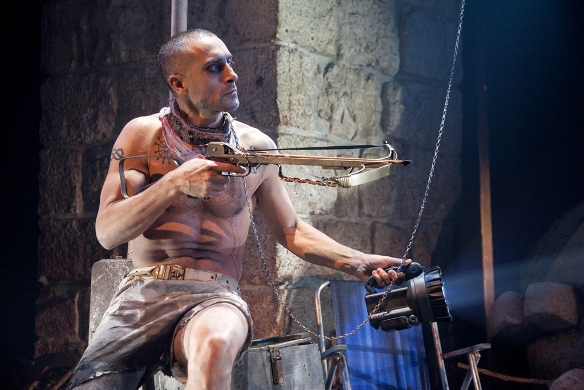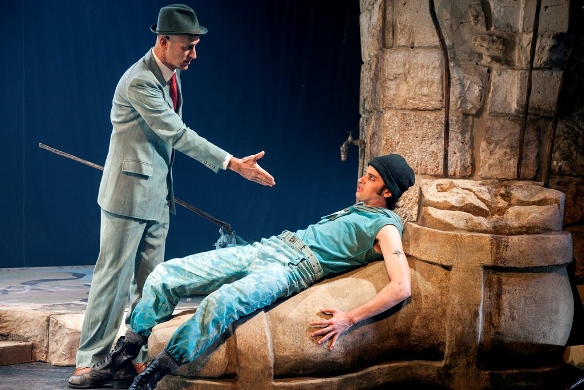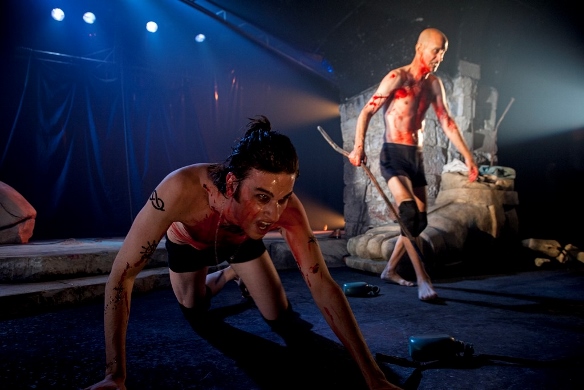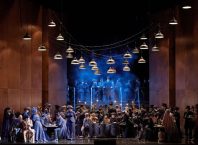Sometimes in the theatre, there is a silence so intense, you can almost feel the audience holding its breath: that is what I felt at the Khan Theatre in the final moments of Philoctetes, Heiner Müller’s play, translated and directed by Avishai Milstein. The performance was so powerful, the production so painfully resonant with the Israeli reality. Feeling the tension in the air as the actors spoke their last lines, I could easily imagine that the people around me felt as I did, as if these words and images had uncovered and penetrated the open wound we have lived with so long that we have almost become accustomed to it. Almost.

Philoctetes is a hero of Greek mythology, his story is mentioned in the Iliad, and was the subject of four Greek tragedies, of those, only Sophocles’ Philoctetes has survived. A skilled warrior who had received his bow and arrow from Heracles, Philoctetes was bitten by a snake, a wound which never healed. According to one version, Philoctetes’ screams of agony, and the foul smell of the festering wound caused Odysseus to abandon him on the isle of Lemnos, so that he would not hinder the abilities of the Greek war ships sailing off to conquer Troy. Yet despite their efforts, the war against Troy went on for years, and many lives were lost. The death of the great hero Achilles brought about a crisis, and ten years after leaving Philoctetes to a bitter and lonely exile, Odysseus set out for Lemnos, accompanied by Neoptolemus, the son of Achilles, for it was said that only with the bow of Heracles would the war be won.

That, is, more or less, the back story. Yet the impact of the Khan production is so immediate, vivid, eloquent and visceral, that it stands alone, there is no need for a knowledge of the myth or Sophocles’ play. The play opens onto the evocative set designed by Adam Keler: an imaginative survivalist camp built on the ruins of a civilization – a colossal head and foot of a broken statue lie on the rocks, a television monitor perched on the side of the head, wires and cables rigged for some purpose unknown. Odysseus (Nir Ron) and Neoptolemus (Ariel Wolf) talk of the war that has claimed so many lives, with no end in sight. It has gone on so long that “no one remembers when it began,” Odysseus intones, and Neoptolemus sums up the current situation: “there’s no hope.”
Yet Odysseus has a plan, and his first step, as any good general or politician, is to engage the loyalty and enthusiasm of his assistant, Neoptolemus. Always alert to photo opportunities and the importance of branding and marketing, Odysseus describes his intended mission to bring Philoctetes back to fight for the Greeks as a “peace mission.” Odysseus and Neoptolemus have their own history, promises were made, and between one promise and another are “great gaping holes” the younger man accuses the elder.
The abandonment of the wounded Philoctetes is a serious betrayal, one that cannot be forgiven. Yet for Odysseus, the only imperative is success. Nir Ron is suave and jovial, never at a loss for words, and ever present beneath the smooth veneer is the capacity for lies, violence, and whatever it takes to get the job done. He is chillingly convincing. Ariel Wolf’s Neoptolemus is young and inexperienced, sincere, and perhaps even a bit wide-eyed in his innocence. Yet by the end of the play there is a difference in his gaze, something wary, perhaps even sly.
And what of Philoctetes? Nimrod Bergman delivers an outstanding performance as the wounded soldier, abandoned by his comrades. His every word and gesture reveals the signs of a man who has lived in solitary suffering for years, pain and anger his only companions. There is a manic look in his eyes, he trusts no one. And yet, there remain the memories of the life he led before his injury, the loyalties, loves and beliefs that formed his identity. Bergman creates a complex portrayal of the man: his wounds, both physical and emotional, the strength revealed in his ability to survive, the suffering inflicted on him by fate and his comrades, and the self-inflicted wound – the festering desire for revenge.
It is a perfectly balanced triad, there are no heroes here. Truth is taken captive, in service of self-serving lies, the drive to survive and prevail at all costs is all-consuming. Maintaining the treacherous balance of power and wonderfully ominous tension of the play are the strong performances by all three actors, supported by a dramatic, yet nuanced text. Avishai Milstein’s translation conveys a sophistication and sensitivity of language, with a contemporary freedom and natural flow. The visual and physical aspects of the play are excellent – Barak Gonen’s stage fighting and Nimrod Zin’s video art contribute to the overall atmosphere of violence, both overt and implied, in a manner that is not only aesthetic, but a definite adrenaline rush.

The entire play resonates with contemporary relevance, as the struggle for survival plays out in a war of wits, fists, and whatever weapons are available in this harsh environment where there seem to be no good alternatives. As Neoptolemus tells Philoctetes: “I have become convinced that in this reality there is no alternative but to lie.” It is a terrifying reality to contemplate, and Milstein presents it in a suspenseful, thought-provoking and moving production.
Philoctetes by Heiner Müller
Translated and directed by Avishai Milstein; Set design: Adam Keler; Costume design: Natasha Tuchman Polyak; Music: Yuval Mesner; Lighting design: Roni Cohen; Video art: Nimrod Zin; Stage fighting: Barak Gonen; Performers: Ariel Wolf (Neoptolemus), Nir Ron (Odysseus), Nimrod Bergman (Philoctetes)





